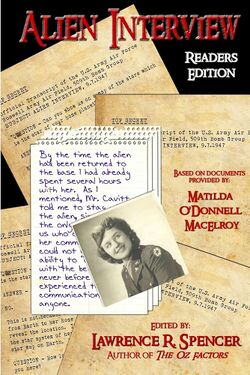Alien Interview
 Front cover | |
| Author | Lawrence R. Spencer |
|---|---|
| Language | English |
| Subject | Alleged revelations of Roswell alien |
| Genre | Non-fiction |
| Publisher | AuthorHouse |
Publication date | 2008 |
| Publication place | United States |
| Media type | Print (paperback) |
| Pages | 288 |
| ISBN | 9780615204604 Also available with ISBN 10: 0615204600 |
Alien Interview is a book nominally authored by Lawrence R. Spencer, consisting of transcripts of interviews allegedly conducted with an extraterrestrial being by former U.S. Army nurse Matilda O'Donnell MacElroy following the Roswell UFO incident in 1947, along with personal notes from MacElroy and research notes by Spencer. According to Spencer, he received the transcripts from MacElroy[1]. In the book, the alien, Airl, describes the nature of conscious existence (that all beings are IS-BEs), the origins of life and of the universe and human history.
Matilda O'Donnell MacElroy[edit | edit source]
Matilda O'Donnell MacElroy (ca. 1923 – ca. 2007), the alleged U.S. Army nurse who conducted the interviews with the extraterrestrial being, is said to have joined the Army during World War II. Most of what is known about her comes from Spencer; her story has never been independently verified, and the authenticity of the account is widely debated. According to Spencer, MacElroy was the source of the material presented in Alien Interview, which claims to be a transcript of interviews she conducted with a surviving alien after the Roswell crash. MacElroy is portrayed as a key figure in translating the alien's telepathic communications with the U.S. military, making her an eyewitness to the alleged government cover-up. Some in UFO circles view her as a whistleblower exposing government secrets, while others consider her a fictional character within a hoax. Despite the book's following among some UFO enthusiasts, skeptics question MacElroy’s existence, the credibility of her account, and the credibility of Spencer.
Involvement in the Roswell incident[edit | edit source]
MacElroy was allegedly stationed at the Roswell Army Air Field] in 1947, shortly after the crash of an unidentified flying object. The book claims that she was one of the first military personnel to interact with a surviving extraterrestrial being, whose name became telepathically apparent to her and which she articulated in the transcripts as "Airl." MacElroy is depicted as having facilitated the exchange between the alien and the U.S. military, acting as a translator and recounting the alien's words to a stenographer for later dissemination. According to Spencer, MacElroy's personal accounts of her time working with the U.S. military during the Roswell incident and her subsequent interviews with the alien were passed to him before her death[1].
Communication with Lawrence R. Spencer[edit | edit source]
Spencer's book claims that MacElroy reached out to him around 1997 when he wrote The Oz Factors, when he had his first and only conversation with her over the phone, and again around ten years later in order to send him the transcripts.
Content[edit | edit source]
The narrative claims that after the Roswell incident, a surviving extraterrestrial was held by the U.S. military and communicated with MacElroy through telepathic means[1]. As such, Alien Interview is one of the earliest produced (in 1947) transcripts of conversations with non-human intelligent beings of the Space Age, which allegedly coincided with higher-volume alien interactions and exotic technology use by terrestrial organizations. The alien, referred to as "Airl," allegedly disclosed details about its civilization, views on life’s purpose, and Earth's history from an extraterrestrial perspective. According to MacElroy’s letters, Airl identified itself as an officer, pilot, and engineer of "The Domain Expeditionary Force," a civilization that allegedly uses our solar system’s asteroid belt as an intergalactic base of operations[2]. MacElroy stated that Airl conveyed that Earth is used as a prison for is-bes from across the galaxy, confined here by an advanced civilization[1].
The book combines alleged first-person transcripts with commentary by MacElroy. Spencer insists the material is authentic, given to him by MacElroy before her death[1].
Disclaimer and authenticity[edit | edit source]
Spencer’s book includes a disclaimer stating it "should be regarded as a work of fiction". Nevertheless, Spencer "maintained on subsequent radio talk shows" that the interview "really happened." [3] In a podcast interview, Spencer repeatedly corrected an interviewer whose question was phrased to imply that Spencer wrote, rather than merely edited, the book.
Reception and analysis[edit | edit source]
Alien Interview has received mixed reviews. Some readers view it as an intriguing addition to literature on aliens and it has a following in some conspiracy theory circles, while others question its authenticity.
The book explores existential questions about identity, consciousness, and humanity's place in the universe, presenting Earth as a containment zone. Interpreted literally, the alien's account supports the notion of alien involvement in human history.
Skeptical reactions[edit | edit source]
A significant portion of the public discussion around Alien Interview is grounded in skepticism. Bill Ryan, founder of Project Avalon, expressed disapproval, asserting that Spencer’s promotion of the book as true discredits legitimate UFO research and "dishonors" other credible witnesses who have shared their real experiences. [3] Members on The Outpost Forum expressed frustration with Alien Interview, with some labeling it outrightly as a "hoax"[4] and "fiction" [3]. Bill Ryan's analysis, describing Spencer’s work as a "dishonorable hoax" that confuses the "complex Roswell issue" and criticizes Spencer for portraying Alien Interview as an "honorable" source when he believes it is, in fact, a misleading fabrication.
Alleged anachronisms[edit | edit source]
Several participants across forums call attention to anachronisms and errors within the book that question its legitimacy. Ryan notes linguistic inaccuracies, such as Spencer’s use of terms like "computer" and "database," which would be historically inconsistent with the alleged events of 1947. Other issues include the "English notation of 9.7.1947," which Ryan identifies as a "little slip" hinting that the text may have been authored recently rather than during the time of the Roswell incident.[3]
Claimed Scientology connections[edit | edit source]
The overlap between Spencer’s narrative and Scientology concepts is a major point of contention. Exopaedia describes Spencer as "a British Scientologist and author who writes science fiction and fantasy," directly stating that Alien Interview is "in essence a work of fiction—some say propaganda—to promote Scientology."[5] Bill Ryan critiqued the book's narrative as filled with "sociolinguistic anachronisms and Scientology vocabulary," such as "doll bodies" and "Space Opera," which echo themes promoted by Scientology founder L. Ron Hubbard and concluded that Spencer's book might be deliberately interweaving Hubbard’s ideas with a fabricated alien narrative. Both Bill Ryan and Exopaedia note the frequent use of Scientology terminology in Alien Interview, including phrases like "doll bodies" and concepts like Earth as a "prison planet," which are recognizable within Hubbard’s works. Ryan emphasizes that many concepts in Alien Interview can be “instantly recognized” by Scientologists.[5][3]
References[edit | edit source]
- ↑ 1.0 1.1 1.2 1.3 1.4 Spencer 2008.
- ↑ Spencer 2008a.
- ↑ 3.0 3.1 3.2 3.3 3.4 "Project Avalon Forum thread on Alien Interview". Retrieved November 3, 2024.
- ↑ "The Outpost Forum thread on Alien Interview". Retrieved November 3, 2024.
- ↑ 5.0 5.1 "Exopaedia entry on Lawrence R. Spencer". Retrieved November 3, 2024.
Spencer, Lawrence R. Alien Interview. Publisher: Lawrence R. Spencer, 2008. Softcover, ISBN 10: 0615204600; ISBN 13: 9780615204604.
External links[edit | edit source]
Alien Interview Official Website

